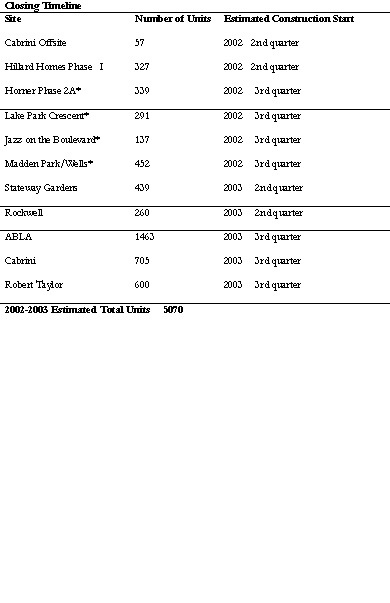Thanks to the involvement of new development teams and the availability of new revenues, the CHA Transformation Plan is making measurable progress.
Two and a half years into the Chicago Housing Authority's (CHA) Plan for Transformation, questions remain. When will buildings be developed to replace the ones that are being torn down? And will they provide a quality, stable community for CHA residents and their neighbors?
On May 16, 2002, the Metropolitan Planning Council and the John D. and Catherine T. MacArthur Foundation co-hosted a Stakeholders Update on the Chicago Housing Authority Plan for Transformation, focusing on redevelopment. The meeting was intended to provide an update on redevelopment activities relative to the original goals of the Transformation Plan, as well as information on the City’s efforts to facilitate the success of the Plan.
CHA CEO Terry Peterson, together with CHA Managing Director of Development Bill Little and Assistant to the Mayor Rich Kinszyk, addressed these questions before an audience of approximately 50 stakeholders.
Mr. Peterson began by reviewing recent accomplishments in the redevelopment arena. The CHA received two HOPE VI awards for the Rockwell and Taylor projects, and became the first public housing authority to go to the bond market — and received AA ratings.
Peterson reminded stakeholders of the original intent of the plan, saying that "the Chicago Housing Authority is committed to creating diverse and inclusive communities through the development of mixed-income housing. We are committed to ending isolation by building vibrant communities."
In addition to fulfilling HUD’s mandate to tear down all 53 "gallery-style" high rises, the Transformation Plan calls for the redevelopment of 25,000 units of public housing — enough to fulfill the CHA’s commitment to ultimately provide all leaseholders (as of October 1999) with new or improved homes. Although close to 14,000 vacant units that were uninhabitable as of 1999 will be permanently lost, the redeveloped public housing is designed to leverage additional affordable and market rate housing. The goal of the Transformation Plan is to provide that the public housing within mixed income communities, where approximately one-third will be available to families earning less than 30 percent of median area income ($22,600 for a family of four), one-third will be "affordable" to families earning no more than 120 percent of median area income ($90,480 for a family of four), and one-third of the units will be priced at market rate.
Overall, the 25,000 public housing units will provide the following:
- 6,149 new homes for families
- 3,578 renovated homes for families
- 3,017 additional family units that will either
be new or renovated
- 9,480 units for seniors
- 2,776 scattered site units
- 25,000 units total public housing commitment
According to Bill Little, several closings are scheduled before the end of 2002, including Phase I development activities at four priority sites: Jazz on the Boulevard (formerly the Drexel site), Wells Madden, Henry Horner and Lake Park Crescent.

Within the four priority sites*, the total number of public housing units estimated to be reserved for CHA residents at the completion of Phase I is 360 of a total 1,151. The remaining units will be a mix of rental and ownership housing, priced at both market and affordable rates. (For more information, visit www.thecha.org.)
Little acknowledged the difficulties and challenges involved in making each of these projects feasible and getting them to close on time. This requires at least 12 months of master planning, a competitive developer selection process, and – most challenging of all — the need to secure the many layers of financing needed for each project, many of which require at least four different layers of funding. For the first time ever, the State has set aside one-fourth of all tax credits exclusively for public housing development — that’s three million a year for the creation of public housing units. Perhaps even more amazing, is the City’s move to privatize public housing development by issuing bonds that are expected to generate $291 million in revenue. Other funding sources include: HOPE VI and Capital Dollars from HUD, Low Income Housing Tax Credits, projected TIF revenue administered through the Chicago Department of Planning and Development, conventional mortgages, and Federal Home Loan Bank and private foundation money.
While funding for each project is being secured, a number of development activities happen simultaneously or are triggered by the completion of a step on the timeline. (For example, the land must be cleared and assembled before designs are approved, water lines put in and new roads laid.) A working group, made up of CHA tenants, developers, resident advocates and city officials, oversees each project. The working group selects the master developer and works alongside the development team at every step along the way, making decisions, approving plans and disseminating information to residents. And while each project follows a similar redevelopment timeline, each project is unique in size, unit mix and neighborhood context. So the one-size-fits-all approach does not necessarily apply from one project to another.
According to Little, the mayoral appointment of Kinszyk to the team has already helped to streamline the redevelopment process. His role is critical in coordinating the efforts of the various City departments to assist developers and the CHA in better planning and use of resources.
Kinszyk, explaining that "my job is to make sure we think cohesively," pulls together weekly meetings of all the key departments involved in supporting the Transformation Plan via needed infrastructure work. Many of the old high rises, he explained, were sites "just plopped on," burying old sewers and streets. The new sites are bringing back the grid, which requires tremendous interdepartmental coordination.
For more information on the Plan for Transformation, browse MPC's series of Public Housing in the Public Interest Fact Sheets, or visit the Chicago Housing Authority’s Web site.